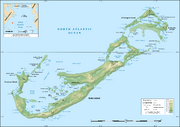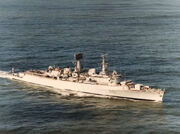

The British military garrison on Bermuda in 1986 was made up of the regular 2nd Battalion, The Royal Anglian Regiment (the rest of the regiment had joined B Company since 1985

), the Territorial Army A Squadron, The Lothian and Border Horse, L Troop, Royal Horse Artillery (8x L118 105mm howitzers) and the local Bermuda Regiment. There was also a small Royal Marine garrison company who guarded the naval base and dockyard and a USMC security company that guarded USN facilities on the island.
Since 1985 the RAF had deployed No.74 (Tiger) Squadron with its Phantom F-4J(UK)s. The logic of deploying this model was that it would be easier to source spare parts, such as J79s from the Americans rather than ship RR Spey engines across the Atlantic. The RAF also based a Victor K.2 on the island and Nimrod MR.2s were frequent visitors.
Since 1985 the Royal Navy was also making more use of HMNB Bermuda. While duties in the Caribbean was still mainly handled by the Tribal class frigates, Bermuda had become the base for an RN Support Group, usually made up of a single ‘County’ class destroyer (in 1986 it was HMS Fife) and three, or four frigates and a single RFA. The Fleet Air Arm also based a flight of Wessex HU.5 helicopters on the island for VERTREP duties and a flight of Hawker Hunter T.8s; the later were mainly meant to train RN and allied warships working out of Bermuda, but they could still carry weapons. One other beneficial development in the year since the start of the war was that apart from the Tribal class most British frigates now carried the more capable Lynx HAS.2, or 3 helicopters, rather than the Wasp HAS.1. Larger ships, like the County class carried the Wessex HAS.3, while the various RFAs carried either the Wessex HU.5, or the Sea King HC.4, or HAS.5.
The main preoccupation for British and Allied forces operating out of Bermuda was support of the North Atlantic and Caribbean convoys. Bermuda was also being used for ‘runs ashore’ by various warships and the resident garrison occasionally sent a company to Belize to relive the resident company there. This often led to the odd situation of the Royal Anglians temporarily having a company from another regiment under its command. There were some minor insurgencies on various Caribbean islands, for example minor trouble simmered on in Jamaica, with the odd bomb and gun attack, but nothing that was considered serious and could easily be handled by the local Security Forces.
Nobody had really considered just how much of a thorn in their side the Soviets considered Bermuda to be. It was an important naval base and dockyard from where Allied warships sailed from to hunt Soviet submarines and disrupt their surface convoys. They were very keen to eliminate this threat, but knew that an attack by missile submarine would only damage the facilities and they did not have the resources to mount a major opposed invasion. However like most Western countries there was a leftist political group on Bermuda, which by the start of the war had been heavily infiltrated by Soviet backed Communists. If these people could be properly trained and combined with Spetsnaz then it might be possible to overthrow the British colonial authorities and neutralise Bermuda as an Allied base. If it failed them at least military operations from Bermuda might be seriously disrupted. The Special Branch of the Bermuda Police Force had picked up indications that something was going on in the leftist community and there were several arrests in the lead-up to the up-rising. However the Security Forces did not find out the scope of what was going on until it was almost too late.
In the days before the rebellion there was an ominous calm on the island. Military operations continued as normal, with a few more security patrols and the civilian population got on with their lives as best they could. Meanwhile Soviet Naval Spetsnaz had been infiltrating the island and had met up with local supporters, and were finally moving into their final positions, but more of that later.